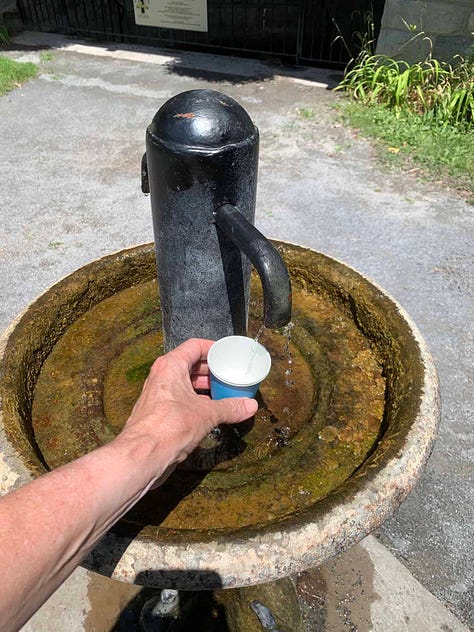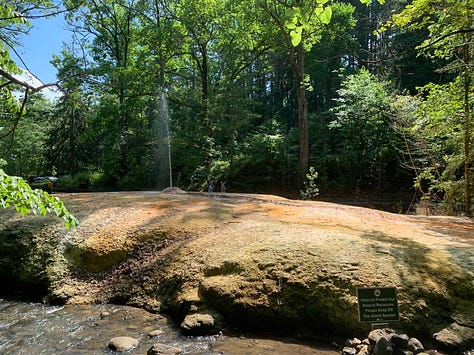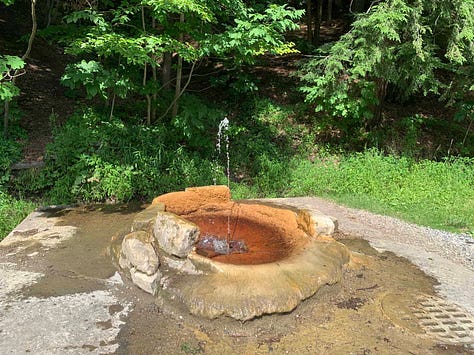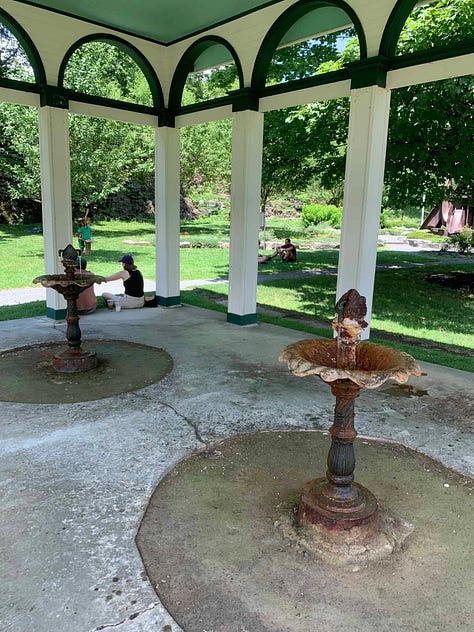149 | The Curious Case of the French Mineral Water Scandal |
Carbon negative foods, chocolate mayonnaise, call for help with lead in spices and tropane alkaloids, new guidance on food fraud prevention
This is The Rotten Apple, an inside view of food integrity for professionals, policy-makers and purveyors. Subscribe for weekly insights, latest news and emerging trends in food safety, food authenticity and sustainable supply chains.
Call for data on lead in spices and tropane alkaloids in foods;
The Curious Case of the French Mineral Water Scandal;
What are carbon-negative foods?;
Food Safety News and Resources;
Chocolate mayonnaise;
Food fraud news, emerging issues and recent incidents
Hi,
Welcome to Issue 149, thank you for joining me. I want to start this issue with a shoutout to 👏👏 Janette of Melbourne Quality Assurance (MQA) 👏👏 who just renewed her Good Apple subscription. Her subscription supports free memberships for students and academics. If you want one of those get in touch with me by replying to this email. If you need help with internal auditing, food safety programs, acting QA manager services and other food safety and quality services, get in touch with Janette.
In this issue, I examine a ‘scandal’ within the French mineral water industry (thank you Ghislain for sharing the investigation report with me). And discover it involves a very unusual food fraud motivation.
Also: what on earth are carbon negative foods?; who would want to eat chocolate flavoured mayonnaise? and a call for help with data on lead in spices and tropane alkaloids. Plus my hand-curated round up of food safety news for everyone, and food fraud news, including new guidance on food fraud prevention for small businesses, for paying subscribers.
Enjoy,
Karen
P.S. Meyya wrote to tell me “Your emails never disappoint". Thank you, Meyya!
Help needed: Lead in Spices and Tropane Alkaloids in Food Commodities
The FAO needs help. Its joint expert committee on food additives (JECFA) is calling for data about
the occurrence of lead in spices, dried bark and culinary herbs in the last 10 years and
the occurrence of tropane alkaloids in food and feed in the last 10 years.
The data request was agreed at a session of the Codex Committee on Contaminants in Foods, and the data will presumably be used to gain a broader understanding of the occurrence of lead and tropane alkaloid contaminants in foods from across the globe.
If you have information that may help the FAO, please share it by following the instructions at the links below. The submission deadline is 31st October 2024.
The Curious Case of the French Mineral Water Scandal
Natural mineral water fascinates me. Water that pours from holes in the ground, clear and cool and ready to drink seems an almost impossible miracle to me, a girl from a big dry country where natural springs are rare. So I was absolutely enchanted by the town of Saratoga Springs in New York State (USA) when I visited earlier this month.
Saratoga Springs is a place where not one, but dozens of natural springs are dotted throughout parks in the town and a nearby state park. The water flows upwards from an underground aquifer, pressurised by carbon dioxide gas in the rock. Each spring comes from a different crack in the rock and each has a different flavour.
It’s safe to drink straight from these springs (yes I did check the micro results at the visitor’s centre) and I got a kick out of finding and tasting as many as I could – though I gotta admit most of them tasted horrible.






Mineral water is also a big deal in France, and Europeans are very fussy about what constitutes an authentic natural mineral water. Regulations aim to ensure that drinking from a bottle labelled ‘natural mineral water’ is exactly the same as drinking straight from the mineral water spring. Mineral water bottlers are therefore not allowed to treat the water except to remove undesirable chemical compounds such as sulphur and arsenic.
The European mineral water regulations specifically prohibit the use of any antimicrobial treatment or anything that is likely to change the number of microorganisms naturally present in the water at its source. If you think that sounds like a problem, you’re not the only one.
In January 2024, news outlets in France published a story alleging wide-scale, long-term fraud in the French mineral water industry, with big brands such as those owned by Nestle named in connection with the scandal. The media reports alleged that some brands were sourcing or treating their water in ways that made it non-compliant with European Union regulations for bottled mineral and spring water.
The European Commission launched an investigation in March and has just published the results. I read the report yesterday and I gotta admit, the whole situation seems kind of weird, at least to a non-European food safety expert like me.
What the investigators found
The European Commission investigation took the form of an audit of French official control systems, not the mineral water companies. Its conclusion? French authorities didn’t do a great job of preventing fraud in natural mineral waters prior to 2022, and don’t have a good system now to detect or prevent fraud in the industry.
“Overall, the official control system does not verify effectively that natural mineral waters placed on the market fulfil the relevant legal requirements. The official control system in place in France is neither designed to detect nor to mitigate fraud in the natural mineral waters and spring waters sector nor is it correctly enforced, making the presence of non-compliant and potentially fraudulent products possible on the market” European Commission Directorate-General for Health and Food Safety in their audit of French control systems
It all sounds pretty bad. The report states that a significant proportion of the natural mineral water industry in France was actively engaging in practices that misled consumers in 2021, and implies that at least some of these practices are ongoing.
Fraud was perpetrated by thirty percent of mineral water operators, say the European Commission auditors, who used the terms “fraudulent treatments” and “fraudulent practices” multiple times in their report. And no one wants fraud in their drinks, right? Usually not, but this situation is quite unusual.
When I talk food fraud I mean food or drink being sold in a way that deliberately misleads or deceives for financial gain (adapted from Spink, et al 2016). Does the mineral water scandal fit this definition? Sort of.
Mineral water businesses were selling products labelled ‘natural mineral water’ that they knew did not meet the European definition of ‘natural mineral water’, because they had subjected the water to unauthorised antimicrobial treatments prior to bottling. And those businesses were gaining a financial advantage over any other business that had chosen to strictly adhere to the European directives. So that does count as food fraud. But…
Companies like Nestle do not usually admit fraud unprompted. And that is what Nestle did in 2021, telling French authorities it was treating its natural mineral water products in ways that “overstepped” regulations. Huh.
Why were almost one-third of mineral water producers, including major brands owned by Nestle like Perrier and Vittel ignoring the European directive for mineral water by using unauthorised treatments? The answer seems to be – and this can be inferred from the report, but is not directly stated - to protect consumers.
Fraud to protect consumers? That’s a new one.
Returning to my definition of food fraud being for financial gain, the benefits gained in this unusual type of fraud are protection against the cost of recalls and protecting the financial value of a brand against losses from a foodborne illness outbreak.
Can food fraud be ‘good’?
With consumer safety as an aim, could these be considered ‘good’ frauds? The fraudulent practices described by the European Commission auditors are unauthorised antimicrobial treatments.
An earlier investigation, conducted by the French social affairs inspection mission, Inspection Générale des Affaires Sociales (IGAS), in 2021 found two operators were using ultra violet and activated carbon treatments, and many were using microfiltration with pore size filters below 0.8 µm – a pore size that could change the viable colony count of the water, which is not allowed. A significant proportion of operators deliberately concealed their use of prohibited treatments from enforcement agencies, said IGAS after their investigation.
Ultra violet, activated carbon and microfiltration are treatments widely used in the global bottled water industry to ensure product safety. They are generally considered to have no discernable effect on the health properties, mineral content or taste of the water.
What now?
The 2024 investigation found that although French authorities took action after the earlier investigation and significantly increased the number of inspections, there are still deficits in French systems. For example, French authorities say that they now accept the use of 0.2 µm filtration if it is necessary to protect equipment and if the bottler can demonstrate that the viable colony count of the water is not affected, even though the European Commission auditors state that such filtration is “not in line with” European legislation.
At least one mineral water business is currently “subject to legal proceedings”, according to the 2024 audit report.
Takeaways for food safety professionals
This situation seems to have occurred because food safety experts in the mineral water industry, and perhaps within France’s food safety agencies, disagree so strongly with the European Commission’s rules preventing antimicrobial treatments they have chosen to ignore them. As a result, the mineral water companies have complied with food safety best practices but have broken the law.
No one has asked consumers what they think about this. Do European consumers feel ‘deceived’ because there are fewer bacteria in a bottle of mineral water than the same water at its source? Or do they perhaps feel relieved that major brands have preventive measures in place to protect them from microorganisms in the water? Do they even care?
It’s possible – and I have no evidence for this – that Nestle’s competitors leaked the IGAS report to the media, it having been presented to French authorities in July 2022 but not made public until after the media broke the news of the ‘scandal’ in 2024.
Whether or not you believe this is a ‘scandal’ that disgraces the big brands (I don’t), the lesson to be learned here is that there are no easy answers for businesses that are supposed to work within regulatory frameworks that could make their products riskier for consumers. Nestle tried to do the right thing by talking to French authorities about the risks, and is now being publicly accused of fraud.
I hope this situation prompts the European Commission to discover, and then align their directives with current consumer expectations about the microbiological characteristics of natural mineral waters and the systems used to ensure they are consistently safe to drink.
In short: 🍏 Media reports of a food fraud scandal in the French mineral water industry prompted an audit by the European Commission in 2024 🍏 The audit found that fraudulent practices related to water disinfection treatments had been occurring in thirty percent of French natural mineral water operations in 2021 and are probably continuing today 🍏 The practices are considered fraudulent because they are not allowed under European Union regulations 🍏 The audit report also describes deficiencies in the French control systems for mineral water, and says they are not designed to detect or mitigate such frauds and that they are not properly enforced 🍏 The frauds are unusual because they seem primarily intended to protect consumers from foodborne illness rather than to deceive 🍏 A major brand owner voluntarily revealed the ‘fraudulent practices’ to French authorities in 2021, presumably out of a desire to have the regulations reviewed for food safety reasons 🍏
Main source:
European Commission Directorate-General for Health and Food Safety (2024) FINAL REPORT OF AN AUDIT CARRIED OUT IN FRANCE FROM 11 MARCH 2024 TO 22 MARCH 2024 IN ORDER TO EVALUATE THE SYSTEM OF OFFICIAL CONTROLS RELATING TO NATURAL MINERAL WATERS AND SPRING WATERS DG(SANTE) 2024-8144. Available at: https://ec.europa.eu/food/audits-analysis/audit-report/download/16661
What are carbon negative foods?
As you know, I browse a LOT of food science content each week. Writing this newsletter is sometimes a struggle, but never because I’ve run out of things to say. Every week I find, and collect, dozens of marvellous examples of food safety and food product innovations, many more than I could possibly write about – at least not without overloading your inbox. My list of potential stories for future issues is 70 pages long 😮.
The other day* I discovered an intriguing article titled Scottish Scientists to Develop New Carbon Negative Food Source.
Reminder: Most foods are ‘carbon positive’ because their production, transport and distribution processes create greenhouse gas emissions such as carbon dioxide from burning fossil fuels for cooking, cooling or transport.
However, it’s worth remembering that the amount of non-fossil-fuel carbon dioxide emitted by food systems is balanced by the carbon dioxide captured when food plants grow. I wrote about this in Issue 17 and it distresses me that the food industry sometimes seems to get more blame for emissions than the fossil fuel industry.
🍏 Why We Keep Getting the Carbon Conversation Wrong (Issue 17) 🍏
The good news is that food producers who don’t use fossil fuels can claim their operations are carbon neutral – that is, they don’t emit any more carbon than they capture from the atmosphere (source). There are many food businesses which claim to be carbon neutral.
But carbon negative? That’s a different thing entirely. To be carbon negative, a food production process must absorb and store more carbon from the atmosphere than it emits.
The article I discovered is the story of a trial in which scientists were able to sequester atmospheric carbon using fungi attached to tree roots. The reproductive parts of the fungi (mushrooms) are eaten, while the majority of the fungus remains underground, resulting in a net sequestration of carbon.
The trial is part of a project aimed at producing edible mushrooms at scale in forests, places that would not normally produce large amounts of food. If successful, the project will encourage afforestation, produce food at scale – up to one thousand tonnes per thousand hectares – and sequester more carbon than typical forests.
Here’s one of the lead researchers explaining how it works.
Find free webinars about emissions legislation for food manufacturers and net zero product design in this week’s food safety news round-up.
In short: 🍏 Carbon negative foods are technically possible and could perhaps be produced at scale 🍏 Trials confirm that edible fungi grown in forests can produce carbon negative food because they sequester significant amounts of carbon underground, while only the above-ground reproductive parts (mushrooms) are eaten 🍏
*’the other day’ = last October 😁
Source: Food Navigator Europe (2023). Scottish scientists to develop new carbon negative food source. [online] Available at: https://www.foodnavigator.com/Article/2023/10/16/Scottish-scientists-to-develop-new-carbon-negative-food-source .
Food Safety News and Resources
Our food safety news and resources roundups are always free and never boring.
Highlights from this week: Food additive warning and cucumber recall update (plus 3 free webinars, guidance and more).
Click the preview box below to access it.
Just for Fun(?) Chocolate Mayonnaise
Heinz Australia has launched a promotional campaign asking consumers to vote on a range of unusually-flavoured mayonnaise, including margherita pizza mayonnaise, cheesy garlic bread aioli, tangy coriander mayonnaise and sweet chocolate mayonnaise.
The most-voted flavour will be launched later this year.
https://criminallytasty.heinz.com.au/
📌 Food Fraud News 📌
Below for paying subscribers: horizon scanning and incident reports
In this week’s food fraud news:
📌 New guidance on food authenticity;
📌 Olive oil authenticity - new paper;
📌 Analytical strategies for sunflower oil and melamine in sports supplements;
📌 Beef warning, pesticide incidents, olive oil fraud, wine fraud, fake juice.
Become a paid subscriber to access The Rotten Apple’s food fraud news.






